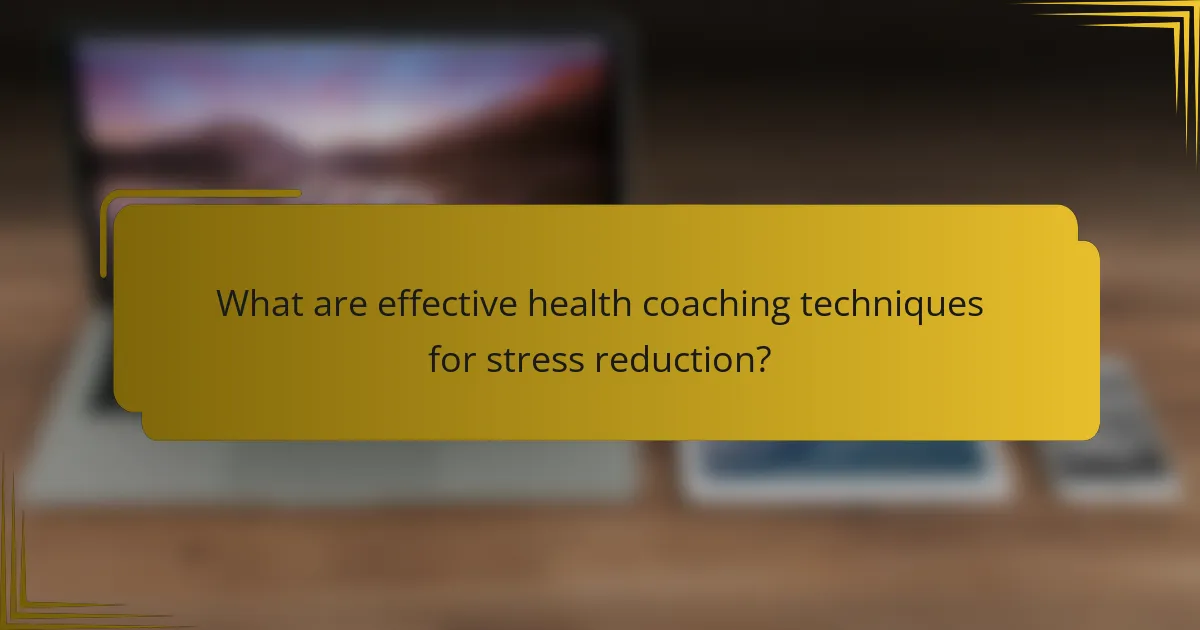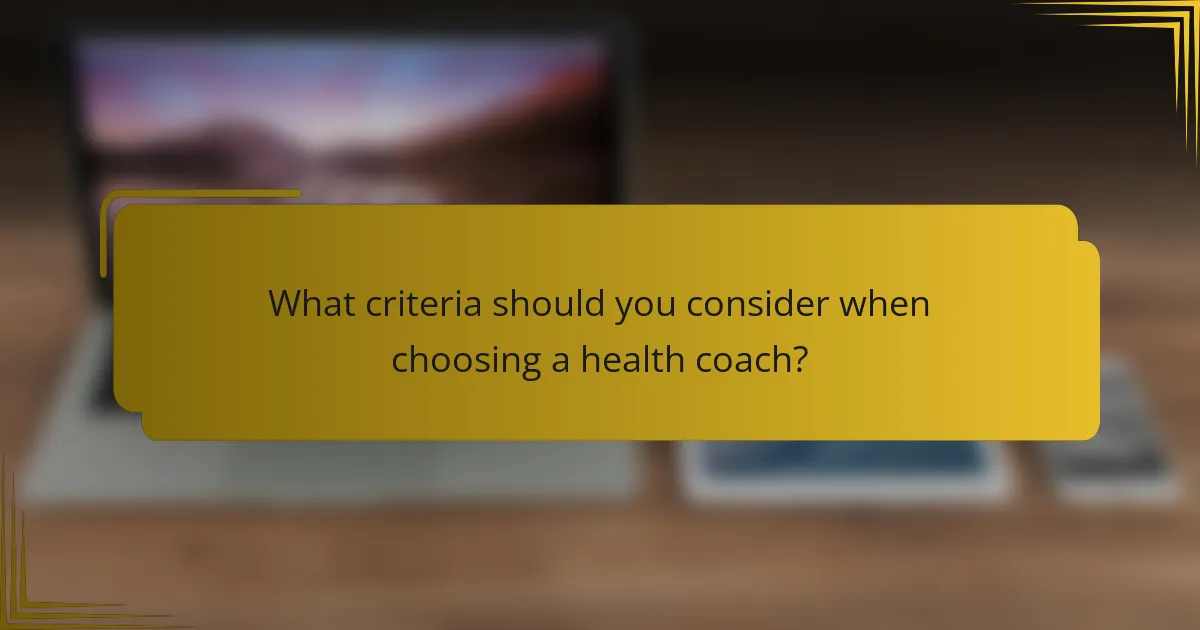Health coaching provides effective techniques for stress reduction, incorporating practices such as mindfulness, cognitive restructuring, physical activity, and nutrition. By tailoring strategies to individual lifestyles, health coaches help clients navigate the unique stressors of urban living, ultimately enhancing emotional resilience and work-life balance. The benefits of health coaching extend beyond immediate stress relief, fostering long-term well-being and fulfillment.

What are effective health coaching techniques for stress reduction?
Effective health coaching techniques for stress reduction include a variety of practices that help individuals manage stress and improve their overall well-being. These techniques focus on mindfulness, cognitive restructuring, physical activity, and nutrition to create a holistic approach to stress management.
Mindfulness meditation
Mindfulness meditation is a practice that encourages individuals to focus on the present moment, helping to reduce anxiety and stress. By dedicating just a few minutes each day to mindfulness, individuals can cultivate a sense of calm and clarity.
To practice mindfulness meditation, find a quiet space, sit comfortably, and focus on your breath. If your mind wanders, gently bring your attention back to your breathing. Aim for sessions lasting between 5 to 20 minutes, gradually increasing the duration as you become more comfortable.
Cognitive-behavioral strategies
Cognitive-behavioral strategies involve identifying and changing negative thought patterns that contribute to stress. This technique encourages individuals to challenge irrational beliefs and replace them with more constructive thoughts.
Start by keeping a journal to track stressful thoughts and situations. Once identified, evaluate the evidence for and against these thoughts. This process can help in reframing perspectives and reducing stress levels over time.
Breathing exercises
Breathing exercises are simple yet powerful techniques for reducing stress. They help activate the body’s relaxation response, making it easier to manage anxiety and tension.
One effective method is the 4-7-8 technique: inhale for 4 seconds, hold the breath for 7 seconds, and exhale for 8 seconds. Repeat this cycle for several minutes to promote relaxation and decrease stress levels.
Physical activity plans
Regular physical activity is a proven method for reducing stress and improving mood. Exercise releases endorphins, which are natural stress relievers, and can help clear the mind.
Consider incorporating at least 150 minutes of moderate aerobic activity, such as brisk walking or cycling, into your weekly routine. Additionally, strength training exercises can be beneficial when done twice a week.
Nutrition guidance
Nutrition plays a crucial role in managing stress. A balanced diet can help stabilize mood and energy levels, making it easier to cope with stressors.
Focus on whole foods, including fruits, vegetables, whole grains, lean proteins, and healthy fats. Limit processed foods, excessive caffeine, and sugar, which can contribute to increased stress and anxiety. Aim for regular meals to maintain stable blood sugar levels throughout the day.

How can health coaching help manage stress in urban environments?
Health coaching can significantly aid in managing stress in urban settings by providing tailored strategies that address the unique challenges of city living. Coaches work with individuals to develop practical techniques that fit their lifestyles, helping them navigate stressors effectively.
Personalized stress management plans
Personalized stress management plans are crafted based on individual needs, preferences, and urban stressors. These plans may include techniques such as mindfulness practices, time management skills, and relaxation exercises tailored to fit a busy city life.
For example, a coach might suggest short, daily mindfulness sessions that can be done during a commute or quick breathing exercises that can be performed at work. This customization ensures that strategies are realistic and applicable in everyday urban scenarios.
Access to local wellness resources
Health coaching often connects individuals with local wellness resources that can enhance stress management. These resources may include yoga studios, meditation centers, and community workshops focused on mental health.
In urban areas, coaches can provide information on affordable options, such as community classes or free events, making it easier for individuals to engage in wellness activities without financial strain. This access helps integrate stress-reducing practices into daily routines.
Community support networks
Community support networks play a crucial role in stress management by fostering connections among individuals facing similar challenges. Health coaches can help clients identify and join local groups that provide emotional support and shared experiences.
These networks might include support groups, fitness clubs, or online forums where urban dwellers can exchange tips and encouragement. Engaging with others can alleviate feelings of isolation and enhance overall well-being, making stress more manageable.

What are the benefits of health coaching for stress reduction?
Health coaching offers several benefits for stress reduction, including improved emotional resilience, enhanced coping skills, and better work-life balance. These advantages help individuals manage stress more effectively and lead healthier, more fulfilling lives.
Improved emotional resilience
Health coaching helps individuals develop emotional resilience, which is the ability to bounce back from stressors. Coaches guide clients in identifying their emotional triggers and developing strategies to respond positively. This process often involves mindfulness techniques and cognitive restructuring to foster a more adaptive mindset.
For example, a coach might encourage journaling or meditation to help clients process their emotions and build resilience over time. Regular practice can lead to a more stable emotional state, reducing the impact of stressors.
Enhanced coping skills
Through health coaching, individuals learn effective coping skills that can be applied in stressful situations. Coaches teach techniques such as deep breathing, time management, and problem-solving, which empower clients to handle stress more effectively. These skills can be tailored to fit personal lifestyles and preferences.
A practical approach might include role-playing scenarios to practice responses to stress, allowing clients to build confidence in their coping abilities. This preparation can significantly reduce anxiety when facing real-life challenges.
Better work-life balance
Health coaching promotes better work-life balance by helping individuals set clear boundaries and prioritize self-care. Coaches assist clients in assessing their current commitments and identifying areas where adjustments can be made to reduce stress. This may involve time-blocking techniques or prioritizing tasks based on urgency and importance.
For instance, a client might learn to allocate specific times for work and personal activities, ensuring that neither encroaches on the other. This structured approach can lead to a more satisfying and less stressful daily routine.

What criteria should you consider when choosing a health coach?
When selecting a health coach, consider their qualifications, experience in stress management, and feedback from previous clients. These factors can significantly influence the effectiveness of the coaching relationship and the outcomes you achieve.
Credentials and certifications
Look for health coaches who hold recognized credentials and certifications in health coaching or related fields. Common certifications include those from organizations like the International Coach Federation (ICF) or the National Board for Health and Wellness Coaching (NBHWC).
Additionally, verify if they have training in specific areas such as nutrition, exercise science, or mental health, which can enhance their ability to support stress reduction effectively.
Experience with stress management
Choose a health coach who has demonstrated experience in stress management techniques. This may include familiarity with mindfulness practices, cognitive-behavioral strategies, or relaxation techniques.
Ask potential coaches about their approach to stress reduction and how they have helped clients in the past. A coach with a solid track record in this area can provide tailored strategies that align with your specific needs.
Client testimonials
Client testimonials can provide valuable insights into a health coach’s effectiveness. Look for reviews or case studies that highlight successful stress management outcomes.
Consider reaching out to former clients if possible, to gain firsthand accounts of their experiences. Positive feedback regarding a coach’s ability to facilitate stress reduction can be a strong indicator of their capability.

How much does health coaching for stress reduction cost?
The cost of health coaching for stress reduction typically ranges from around $50 to $200 per session, depending on the coach’s experience and location. Many clients find that investing in health coaching can lead to significant long-term benefits in managing stress and improving overall well-being.
Average session rates
Average session rates for health coaching can vary widely based on factors such as the coach’s qualifications and geographical area. In urban centers, rates might be on the higher end, often between $100 and $200 per session, while rural areas may see prices closer to $50 to $100.
Some coaches offer sliding scale fees based on income, which can make sessions more accessible for clients with financial constraints. It’s advisable to inquire about these options when searching for a coach.
Package pricing options
Many health coaches provide package pricing options that can reduce the overall cost per session. For example, purchasing a package of five sessions might cost $400 instead of $500 if bought individually, offering a savings of about 20%.
Packages often include additional resources, such as personalized plans or follow-up support, which can enhance the coaching experience. Clients should evaluate the value of these extras when considering package deals.
Insurance coverage possibilities
Insurance coverage for health coaching varies significantly by provider and policy. Some health insurance plans may cover coaching services, especially if they are linked to a medical condition or prescribed by a healthcare professional.
To determine coverage, clients should contact their insurance provider and ask about specific benefits related to health coaching for stress reduction. It’s also beneficial to check if the coach is recognized by the insurance company to ensure reimbursement eligibility.
